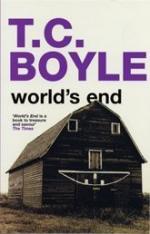|
This section contains 338 words (approx. 2 pages at 300 words per page) |

|
World's End is Boyle's most socially conscious novel, and it is also his most pessimistic. The erratic, eccentric wit of his other books becomes black humor in World's End. What was a picaresque character in Water Music becomes a villain in World's End, and what was historical coincidence becomes predes tined doom. Likewise, if Boyle's many literary allusions in Water Music seemed designed to match his wit with his predecessors', in World's End the allusions seem to call into question the worth of all literature.
1. Does World's End merit the label of "literature of exhaustion," which has been applied to the works of such writers as Borges and Nabokov, who suggest that literature and history have exhausted themselves?
2. How does Washington Irving's playful invention of New York history compare to Boyle's more caustic attempt to do the same?
3. Is Boyle's use of literary allusion and wit...
|
This section contains 338 words (approx. 2 pages at 300 words per page) |

|




